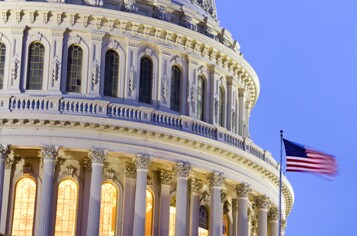
GOP tax reform plan: hold your applause until the end
1) How concerned are you that the credit union tax exemption could still come up as the real dialog on this effort begins?
2) Other than the CU tax exemption not being removed by this plan, what other aspects of the proposal are you taking a close look at?

John McKechnie, senior partner, Total Spectrum, Washington
Credit union friends on Capitol Hill have consistently said two things when tax reform was being drafted: first, the policy arguments for why credit unions are tax exempt make sense to most in Congress; they buy what we’re selling. That’s the main reason why we’re untouched so far. Second, Members of Congress counsel vigilance. They understand that the banks are relentless in their attacks, and realize that this is a once-in-a-generation chance for them to get at credit unions. It would be stunning if the banks DON’T try last-ditch efforts to get an amendment offered. Yes, they’ve failed to win the argument thus far. But this is a process, one that requires the credit union lobby to pay close attention to every development.
Besides the statutory exemption, credit unions (both state and federally chartered) should be watchful on the Unrelated Business Income Tax issue. This has always had the potential to be a Trojan Horse, and there are rumored changes to UBIT being looked at, particularly by the Senate Finance Committee.

Geoff Bacino, CEO, Bacino Associates, Alexandria, Va.
Other issues that may concern credit unions is the elimination of the mortgage interest deduction for loans greater than $500,000. While this may sound like a fairly large figure, this provision could really affect credit unions serving members in New York, California, Northern Virginia, and larger metropolitan cities. And the tax on compensation greater than $1 million for employees of tax-exempt organizations may affect some CEOs.

Dennis Dollar, CEO, Dollar Associates, Birmingham, Ala.
Could removing the tax exemption get added at some point in the legislative process before the final tax reform bill is passed? I guess anything is possible with Congress. As someone once said, no man’s life, liberty or property are safe when Congress is in session. But I see it as very unlikely. The numbers and the politics, as stated earlier, just don’t work. Top that off with the fact that credit unions truly have generated good support on both sides of the aisle. Democrats like credit unions because they serve the little guy and attempt to reach the underserved. Republicans like credit unions because they are pro-small business and their members turn to each other for financial help instead of to the government. I am bullish on the credit union tax exemption remaining untouched in any final tax bill.
I don’t see much in the remainder of this far-reaching tax reform proposal with a great deal of direct credit union implication; however, anything that stimulates the economy and builds consumer confidence benefits the business model of any segment of the marketplace dependent upon borrowers seeking more loans, paying them back timely and finding some money left over to save. That certainly includes credit unions.

Patrick La Pine, CEO, League of Southeast Credit Unions, Tallahassee, Fla.
I am most interested in the treatment of banks and other provisions that could impact CUs down the road. A House Ways and Means staffer told us that bank lobbyists were complaining recently about a provision in the House bill to tax FDIC premiums. Under the Brady draft, banks with more than $50 billion in assets will not be able to deduct FDIC premiums as a business expense; banks with less than $10 billion of assets could continue deducting premiums as an expense. The elimination of the deduction would phase out for banks with between $10 billion and $50 billion of assets. Bank lobbyists see that as a back door way to raise taxes on banks. It would raise $13.7 billion over 10 years. We also need to remember, that the Senate Finance Committee will have its own process and tax reform priorities, which we’ve not seen (publically) yet.
Another way to look at it is: we won the first round (Brandy’s initial draft), Congress is not going to do tax reform again for several years, but the fight is not over until Trump signs a bill or tax reform is declared dead for this Congress.

Susan Mitchell, Susan Mitchell, CEO, Mitchell, Stankovic and Associates, Henderson, Nev.

Scott Earl, president/CEO, Mountain West Credit Union Association, Phoenix, Ariz.

Michael M. Bell, attorney, Howard & Howard, Royal Oak, Mich.

Michael A. Wishnow, SVP-marketing & communications, Pennsylvania Credit Union Association, Harrisburg, Pa.

Tony Ferris, CEO of Rochdale + Paragon, Overland Park, Kan.

Mark Cummins, president & CEO, Minnesota Credit Union Network, St. Paul, Minn.

Eric Richard, principal, CU Counsel, PLLC, Washington
The fact that the legislative process is moving so fast on this bill is good for our side in the current posture of things. Speed makes it more difficult for those seeking changes to line up their forces. But we cannot count on the idea that the proponents of this legislation will always succeed in moving as fast as they want to.
It will take a long time to know all the possible effects of everything that is buried in this long and complex legislation, but one concern is its possible effect on the mortgage market. If buying a home becomes less financially desirable because of changes in the deductibility of mortgage interest, for example, that could have a negative effect on credit union mortgage lending.

Steve Williams, partner, Cornerstone Advisors, Scottsdale, Ariz.
Going forward, the credit union industry still might be targeted. On a budget that is $4 trillion, the credit union tax exemption has been immaterial. This budget proposal is down to some pretty small numbers – $1 billion per year – to make the budget score better from a deficit standpoint. I think most efforts still are looking at high earners and loopholes to be shut down, but the credit union tax exemption is not a loophole for the rich, it is a consumer-friendly tax benefit.
In my opinion, there is a move to take something and give something back, from a deficit standpoint.
The change in the corporate tax rate is most substantial. This could have a positive impact on the economy as too much income and activity has moved offshore. Both parties have been talking about changing the corporate tax rate for decades. There is no guarantee that tax savings will be invested in wages. But our tax rate is so high worldwide in a world that is going to have robots everywhere, we have to do something. We have hotbeds of innovation and a great rule of law, but we have hurt ourselves with a high tax rate. It is not a giveaway to corporations, it is just bringing activity back to the U.S.
The mortgage deduction limitation at $500,000 actually could have some negative impact. In some metro and coastal markets, home mortgages over $500,000 are quite common in this low-rate environment, and any interest under this bill would no longer be deductible.
When you look at tax rate changes and expanded childcare credits balanced against the personal exemptions, it hard to see this being much of a boon to the middle class. It is really quite complex in its provisions to really be called a tax-simplification bill.
I do not see a big impact from the phasing of the estate tax for credit unions as only 0.2 percent of American households fall over the $5.2 million estate amount today. This is not in the middle of the bell curve where credit unions operate.
There is a split between child care expense deductions and the new standard deductions. I see it as a netting-out effect for the middle class. Maybe there might be a $100 per month savings for the middle class. There are plenty of things credit unions are doing proactively to help their members that are as substantial as the economic impact of this potential tax cut.

Jeremy Empol, vice president of federal government affairs for the California and Nevada Credit Union Leagues, Rancho Cucamonga, Calif.

Jim Phelps, chief advocacy officer, Cornerstone Credit Union League, Plano, Texas






